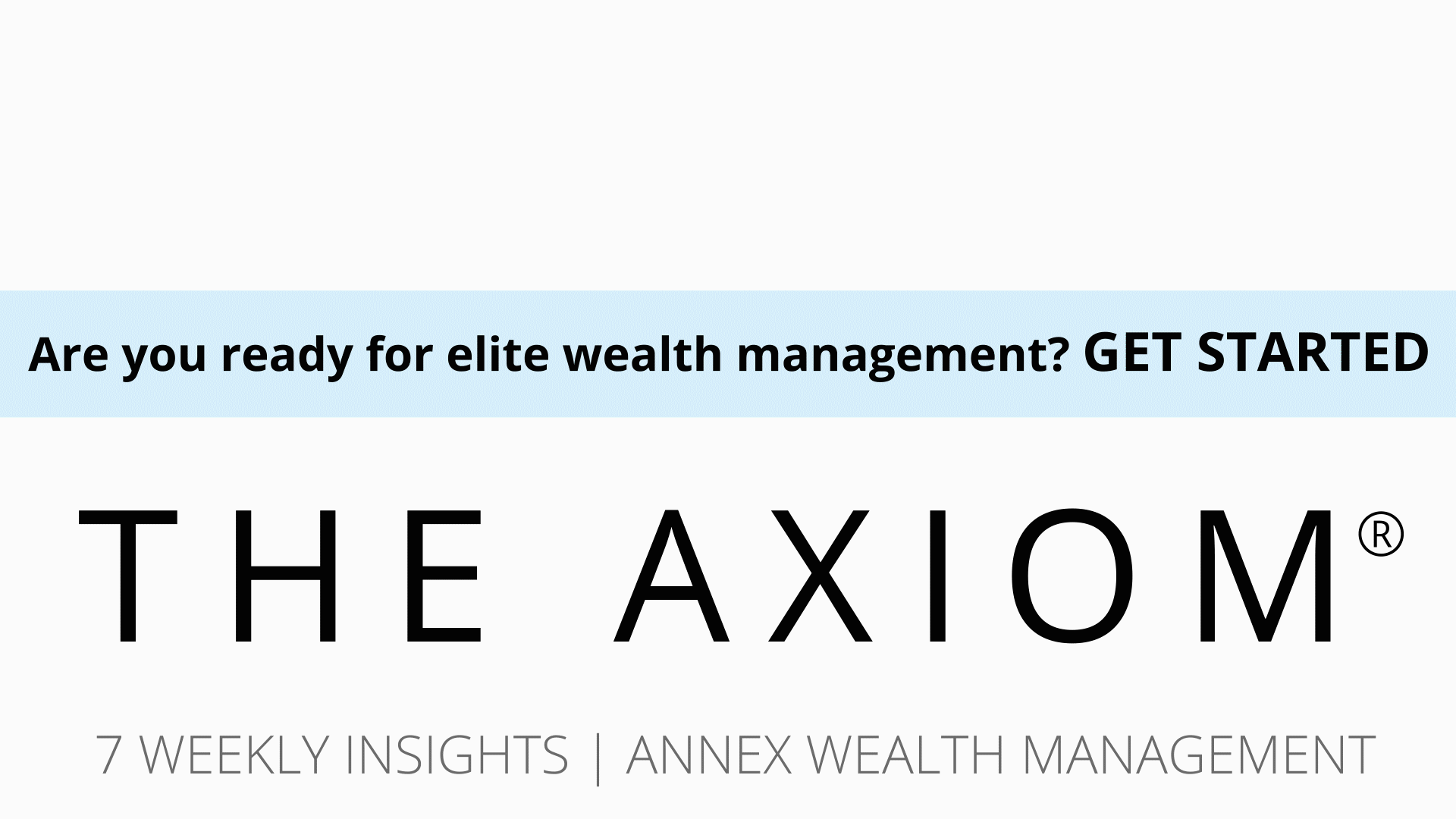
Axiom | Vol 265
Market Reacts To Delta Variant

Meet The Axiom®’s Guest Editor: Trevor Nargis
Hi, I’m Trevor Nargis and I’m on Annex’s Investment Management Team.
I’m involved with the day-to-day management and monitoring of the firm’s model investment strategies.
I was born and raised in Milwaukee and am an avid fan of all things Wisconsin sports (big shoutout to the Bucks for bringing home the 2021 NBA title!) In my free time, I enjoy playing soccer and exploring the area with my girlfriend, Ingrid, and my dog, Hank.
I really enjoy the Axiom because it showcases the great talent we have at Annex and is filled with thoughtful insights on a wide array of topics. It provides a great recap of things we’ve been watching and what we’re paying attention to going forward.
BACK TO TOP ↑

Market Reacts To Delta Variant
Markets are driven by three things: liquidity, sentiment, and earnings – and the current market checks most of those boxes. Annex Wealth Management’s Dave Spano and Derek Felske discuss.
BACK TO TOP ↑

Poll Recap: How Many Of These Myths Do You Agree With?
In a recent radio segment, Annex Wealth Management’s Brandon Lehman, CFP®️ helps separate fact from fiction when it comes to millionaires.
Myth #1: If you have a high salary, you’re set for life.
You would certainly think that if you make a lot of money, you’re going to have a lot of money. Unfortunately, that’s not always the case. The truth is, if you save a lot of money, you’re going to have a lot of money. Millionaires are good savers.
Fact: On average, 31% of millionaire salaries go to savings.
Myth #2: It’s all luck.
This couldn’t be farther from the truth. The majority of millionaires made their millions as a result of hard work and sacrifices – including blood, sweat, tears, long hours, and time away from family.
Fact: 82% of millionaires are self-made.
Myth #3: You have to make all your money before you retire.
Actually, many millionaires didn’t have a million in the bank before retirement. How is this possible? They continue to grow their money by staying invested and saving, while avoiding over-spending by carefully watching where their dollars are going.
Myth #4: You must have a fancy college degree.
While it does help to have a degree from Harvard or Yale, the vast majority of millionaires do not. They’re self-made who have capitalized on an opportunity or niche, and strived hard in order to reach millionaire status.
Myth #5: They work for big banks, law firms & tech companies.
Well, some of them do, but certainly not all. Whether it’s owning a paper printing company, clothing store, or even a farm – millionaires come in all forms. What they have in common – a willingness to put in the work, which sometimes takes years and a lot of patience.
Fact: 66% of millionaires own their own business.
Myth #6: Success comes easily & early.
Remember the saying – nothing worth having comes easy? We’re seeing the age of millionaires rise, because people are working harder for longer. Not only that, millionaires are getting smarter and diversifying their income streams. They not only own the business – they own the building, and the business pays them rent.
Myth #7: They don’t have anything to worry about.
Everyone has the same thing to worry about – health. Many millionaires have put all their attention into growing a business, while their personal health takes a back seat. For some, retirement is finally the time to focus on self-care.
Millionaires also have a unique set of worries when it comes to leaving money behind. They’ve built a legacy and they want to make sure their family can benefit from it when they’re gone.
Myth #8: They’ve got their future all figured out.
Here’s where Annex comes in. Millionaires are experts at what they do, however there will always be areas where they need help – often times that includes creating a financial plan and roadmap for retirement. Luckily, Annex has experts on every level – estate planning, investment planning, taxes, and retirement. They don’t have to worry about having it all figured out because our team of experts has got their back.
BACK TO TOP ↑

“I like MoneyDo’s because they’re timely reminders of things to be cognizant of in one’s own financial plan. They help showcase all the different things we take into consideration and think about when it comes to planning.”
– Guest Editor:
Trevor Nargis | Investment Management Specialist
________________________________________
Understand Your Pension & Lump Sum Payment Option
Although pensions are becoming less common across the country, employees with many years of work history may have a pension as part of their benefits. Some companies that offer pensions now face a massive financial obligation to fund this benefit for their workers. Accordingly, these companies may look for ways to reduce the long-term risk of meeting those pension commitments.
One common offering from employers is granting employees the option to receive a lump sum pension benefit – a one-time, large payment instead of a monthly income for life.
If you’re an employee faced with a similar pension decision, this week’s MoneyDo is for you: understand your pension and lump sum payment options.
When faced with a lump sum decision, you will generally have two options:
1. Receive a pension payment monthly for the remainder of your life.
- There may be an option for your spouse to continue receiving payments after your passing, which is commonly referred to as a joint and survivor pension. This generally reduces the monthly payment.
2. Receive a lump sum payment, which can be transferred into your IRA. There, you can manage the investment and have greater control over the payout schedule.
Consider these factors when deciding which option is best:
- Monthly payments are typically paid out over your life span – with an option to continue that payment over your spouse’s life span as well. Individual and family health history should be considered for both you and your spouse. The longer you anticipate you and your spouse will live, the more beneficial a pension income stream may be over a lump sum payment.
- When analyzing a pension versus lump sum payout, we also suggest looking at the health of the pension plan. An underfunded pension could leave you without the income level you were planning to receive.
- If you were to take a lump sum and deposit it into your IRA, what rate of return would you earn on that investment? How long can the lump sum payment produce an equivalent monthly income compared to the pension?
- Does the pension have a cost-of-living adjustment? Typically, this means the monthly payment would increase every year with inflation.
- Consider how your decision supports and enhances your financial plan.
- Does your plan require a stable payment? Or can your plan withstand the potential volatility of investing the money in the market?
- Will you need access to the funds at a faster rate than your monthly pension payment?
If you have questions, find an advisor you can trust to help you with this important asset. At Annex Wealth Management, we have a team of experts who can advise you on choosing the path which is in your best interest.
BACK TO TOP ↑

“Ask Annex is great because the questions are always relevant to what’s happening in the world around us. Our team does a great job of answering Ask Annex questions in a straightforward fashion. It’s also another cool way for us to gain insight into what our readers are paying attention to/thinking about.”
– Guest Editor:
Trevor Nargis | Investment Management Specialist
________________________________________
This week’s Ask Annex comes from Sue, who asks:
“Real Rate of Return vs. Total Returns in my financial plan?”
___________________________
We asked Annex Wealth Management’s Jack Hauser, CFP®:
Total Return is the absolute return on an investment over a period of time that includes interest, dividends, and capital gains. This measure of performance combines both an asset’s appreciation and income production. For instance, if you buy a stock at $100, receive a dividend of $4, and then sell it at $103, you made $7 or 7%.
The Real Rate of Return takes into account inflation. So if you assume in the prior example, that inflation was 3%. Your 7% return is now 4%.
This Real Rate of Return is extremely important when it comes to your financial plan. You not only need your assets to grow over time in order to fund your retirement nest egg, but you also need them to grow faster than inflation in order to preserve your purchasing power.
At Annex, our financial plans typically model a rate of return on investment accounts that outpaces inflation by 3% over a longer time horizon. We do this to stress test your financial plan to make sure that you will be able to accomplish your financial goals. If the Real Rate of Return you’re using in your financial plan results in a high risk of outliving your assets, then we wouldn’t suggest increasing the risk of your portfolio to a level outside your risk tolerance in order to chase higher returns. Instead, we would suggest reviewing appropriate other inputs and outputs of your plan such as when you retire, how much you withdrawal from your portfolios, when to take Social Security, when to turn on a pension, and many many more.
When reviewing your financial plan, it’s important to consider how different Real Rates of Return affect your portfolio’s longevity and if your portfolio’s risk is appropriate relative to your risk tolerance and your risk appetite. Annex Wealth Management would be happy to meet and discuss how this applies to your specific situation.
– Jack Hauser, CFP®
BACK TO TOP ↑

Does Your Advisor Have Their Own In-House Estate Planning Attorney?
When we’re younger, we tend to focus first on taking care of ourselves, whether it’s personally, professionally or financially. Life changes, and so do our priorities. Sometimes, it’s when we have children; at other times, our responsibilities grow to include our parents or other loved ones.
If you’re at a place in your life where your responsibilities and priorities extend beyond yourself, it’s time to put pen to paper and make your wishes and oral arrangements legally binding through various estate planning documents.
Consider these reasons to start estate planning for ourselves and our loved ones.
BACK TO TOP ↑


KNOW THE DIFFERENCE MINUTE:
Research Suggests Retirees Spend 130% Preretirement Salary
KNOW THE DIFFERENCE MINUTE:
Prescription Drug Inflation, Higher Healthcare Costs
ASK ANNEX
What Do You Know About The New Tax Cut & How Will It Affect Me?
BACK TO TOP ↑

Annex Wealth Management provides free workshops, open to the public, on key wealth management topics.
Each week, we provide links to register for upcoming events.
BACK TO TOP ↑